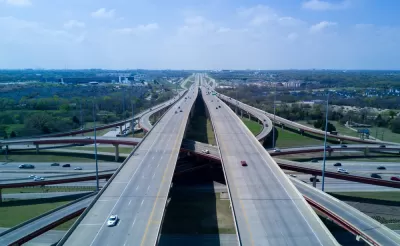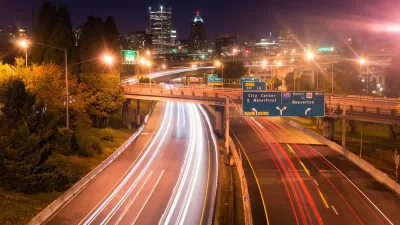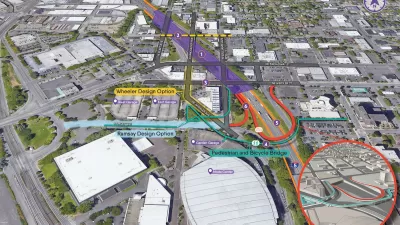Far from kickstarting a transformative change in transportation policy, the 2021 bipartisan infrastructure law continues to fund traditional road-building projects.

Despite President Biden’s assertion that the 2021 bipartisan infrastructure law was “a historic spending measure that would not only improve the nation’s dilapidated roads and bridges, but also address climate change and help communities recover from past transportation policies that segregated people of color,” funding from the bill is in fact largely “fueling a rush of highway projects like Houston’s expansion of Interstate 45 that could undercut the administration’s environmental goals, said Beth Osborne, a former acting assistant secretary for transportation policy at the Department of Transportation.”
This according to an article by Mike Lee in Climate Wire, which asserts that without changes to “long-standing funding formulas that historically have fueled state efforts to pave more lanes,” the law will continue to fund traditional road expansion projects.
As one example, Lee outlines the contentious history of the North Houston Highway Improvement project, an expansion of Interstate 45 which the Texas Department of Transportation (TxDOT) is attempting to push forward with despite years of opposition from local leaders, including the city’s mayor, and community groups. After ordering the agency to stop work on the project while the Federal Highway Administration (FHWA) investigated a civil rights complaint, “In March, FHWA said it had resolved its civil rights investigation and reached a settlement with Texas officials that would allow the project to be built.”
FULL STORY: A transportation ‘revolution’? How the infrastructure law is fueling freeways.

Planetizen Federal Action Tracker
A weekly monitor of how Trump’s orders and actions are impacting planners and planning in America.

Congressman Proposes Bill to Rename DC Metro “Trump Train”
The Make Autorail Great Again Act would withhold federal funding to the system until the Washington Metropolitan Area Transit Authority (WMATA), rebrands as the Washington Metropolitan Authority for Greater Access (WMAGA).

DARTSpace Platform Streamlines Dallas TOD Application Process
The Dallas transit agency hopes a shorter permitting timeline will boost transit-oriented development around rail stations.

LA County Creating Action Plan to Tackle Extreme Heat
Los Angeles County is creating a Heat Action Plan to help communities stay safe during extreme heat, with steps like adding more shade, improving buildings, and supporting the neighborhoods most at risk.

Maryland Plans Quick-Build Complete Streets Projects
The state will use low-cost interventions to improve road safety in five Maryland counties.

Downtown Los Angeles Gears Up for Growth
A new report highlights Downtown L.A.’s ongoing revival through major housing projects, adaptive reuse, hospitality growth, and preparations for global events in the years ahead.
Urban Design for Planners 1: Software Tools
This six-course series explores essential urban design concepts using open source software and equips planners with the tools they need to participate fully in the urban design process.
Planning for Universal Design
Learn the tools for implementing Universal Design in planning regulations.
City of Charlotte
Municipality of Princeton
Roanoke Valley-Alleghany Regional Commission
City of Camden Redevelopment Agency
City of Astoria
Transportation Research & Education Center (TREC) at Portland State University
US High Speed Rail Association
City of Camden Redevelopment Agency
Municipality of Princeton (NJ)





























